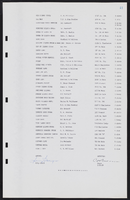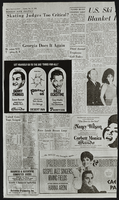Search the Special Collections and Archives Portal
Search Results
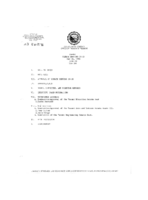
Meeting minutes for Consolidated Student Senate University of Nevada, Las Vegas, May 24, 1990
Date
Archival Collection
Description
Text
Eva Futch oral history interview
Identifier
Abstract
Oral history interviews with Eva Futch conducted by Claytee D. White on November 02, 2010 and November 10, 2010 for the Boyer Early Las Vegas Oral History Project. Futch begins by discussing her personal history in Sweden, describing her early life, education, and what life was like in Sweden. She continues by describing her involvement in the boxing industry through her husband, Eddie Futch, who was a prominent boxing trainer. Futch provides insight into various aspects of boxing, how her husband trained fighters, and provides details on how the industry operates and the athletes she met. Futch describes moving to Las Vegas, Nevada in 1995 and the boxing events she was involved with in the city. She also goes through a series of photographs and memorabilia of her husband and explains their history and significance.
Archival Collection
Fields, Jackie
Bio taken from Wikipedia: "Jackie Fields (Jacob Finkelstein, February 9, 1908 – June 3, 1987) was an American professional boxer who won the World Welterweight Championship twice. Statistical boxing website BoxRec lists Fields as the #19 ranked welterweight of all-time. Fields was elected to the United Savings-Helms Hall of Boxing Fame in 1972, the International Jewish Sports Hall of Fame in 1979, the World Boxing Hall of Fame in 1987, and the International Boxing Hall of Fame in 2004."
Person
Bugbee, Robert W., 1926-1993
Robert W. Bugbee was born August 21, 1926 in Omaha, Nebraska to CO Bugbee and Ehtel Passoth. He moved to Las Vegas, Nevada in the early 1950s. In the late 1960s, Bugbee founded the Las Vegas, Nevada Boys Club an organization that engaged young men in sports and skill building to keep them out of trouble. Bugbee died on September 02, 1993.
Person
#67431: Martinez, Kari; Holt, Kathryn - Staff, 2010 January 12
Level of Description
Archival Collection
Collection Name: University of Nevada, Las Vegas Creative Services Records (2010s)
Box/Folder: Digital File 00
Archival Component
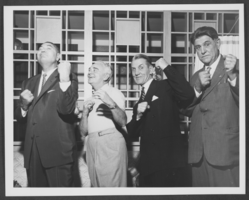
Photograph of Wilbur Clark with professional boxers, location unknown, circa 1950s
Date
Archival Collection
Description
Image
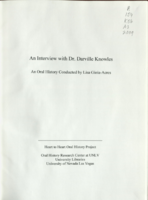
Transcript of interview with Dr. Darville Knowles by Lisa Gioia-Acres, October 9, 2008 and November 9, 2008
Date
Archival Collection
Description
Dr. Darville Knowles was born in Miami, Florida, in 1948. His mother and father were schoolteachers in Dade County. After their divorce in 1962, Darville's mother relocated to Las Vegas with her two sons and took a teaching position here. Dr. Knowles comments on the differences between Miami and Las Vegas as far as segregation regarding housing, education, and job opportunities. He also mentions that his grandmother had emigrated from the Bahamas and that she impressed on them to make their own situation and community better. He recalls that track and field athletics were desegregated before the contact sports, such as football and basketball. Darville and his brother Michael (a lawyer in Miami) both graduated from college. Darville attended Howard University and Stanford University Medical School and completed his internship at the Jewish Hospital of St. Louis. Dan Wilkes, a family friend and pathologist in Las Vegas, convinced Darville to look at Las Vegas for job opportunities. After trying St. Louis, Atlanta, Houston, and Los Angeles, Dr. Knowles finally settled in Las Vegas in 1982 and "grew' his practice at Sunrise Hospital. Dr. Knowles comments on health problems in Las Vegas related to eating choices, lack of exercise, and poor air quality. He describes how HMOs have changed the practice of medicine and gives his opinions on how health care should be addressed by Congress. He also discusses the future of medicine, the research he was involved in, and the AIDS crisis. Dr. Knowles talks about how medicine has changed since 1982, the large number of respiratory problems that he treats, and comments further on HMOs and the fixture of medicine in Las Vegas. He also shares that he found time to author a murder mystery and has plans to write more.
Text
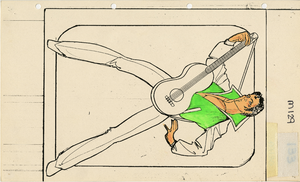
Costume design drawing, male dancer in a green jacket, Las Vegas, June 5, 1980
Date
Archival Collection
Description
Costume Details: Male dancer in a green and white sports jacket, white pants, and white shoes holding a white guitar.
Show Name: Jubilee!
Performance Name: Minstrel opening: Elvis
Site Name: MGM Grand Hotel and Casino
Image

